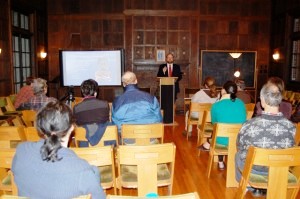![]()
The Words of the Murray Family
|
|
The Words of the Murray Family |

Dr.
Murray
The Rev. Dr. Stephen Murray, senior pastor of the First Baptist Church of Boston, and new Dean of Barrytown College -- a project being developed by UTS -- gave an interesting and thought provoking powerpoint presentation on "Religious Diversity and the American University" at the UTS Speakers' Forum this past Wednesday, Nov. 28th in Barrytown.
The religious landscape of American universities have changed dramatically over the years, he explained. The earliest colleges, such as Harvard, Yale, Princeton, and many others, were originally started as seminaries to educate future religious leaders. They were begun by traditional Protestant churches, and their chapels were always filled for Sunday service -- it was generally required that all student attend services.
But when we fast forward to today, Dr. Murray said, "If you hear music in a college chapel these days, it's probably a music professor practicing his/her craft." The chapels are all but empty on Sundays, except for an occasional wedding, or a student looking for a quiet place to study, he said.
The college chaplain of the past was a man who cared for, and taught religious doctrine to his Protestant flock, but with the explosion of religious alternatives in our time, today's college chaplain might be a man or woman of the Hindu, Jewish, or Moslem religion, or any other world religion -- even a Roman Catholic priest serving in a protestant university, explained Dr. Murray, and they have to able and willing to care for students of any religious background, or those who are not religious at all.
In the past, the majority of students on campus were practicing Christians of one of the Protestant denominations or Catholic. Today, most students are either secular, with no belief in God, or spiritual seekers who are interested in personal spirituality, but who do not want to join a traditional religion. Thus, the challenge of a college chaplain is no longer just to make sure students are in church on Sunday, but to work with students of a variety of beliefs and spiritual needs often outside the traditional Sunday gathering.
Although Dr. Murray said that college chaplains need to be rooted in some religious tradition, they are also required to be sensitive and respectful of other religious traditions. The chaplain must be a religious pluralist, who acknowledges and can work with students covering a wide diversity of religious orientations.
The Barrytown College, when it opens, will be one of the first truly interfaith colleges in American, Dr. Murray said, and he believes it is right in step with the religious diversity of the times we are living in today.